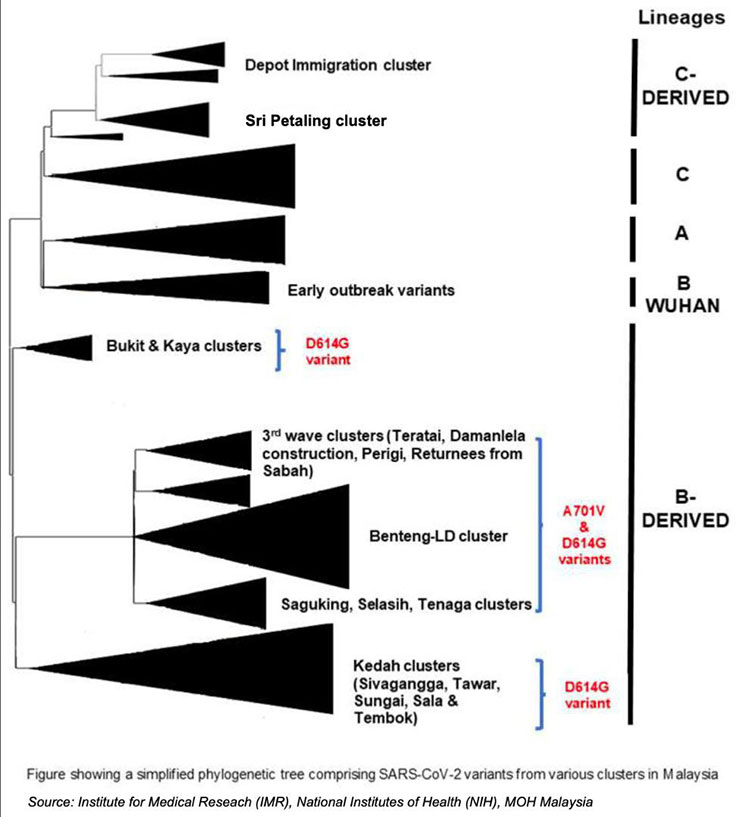COVID-19 | The highly infectious Covid-19 strain that prompted UK authorities to scrap Christmas plans and impose a lockdown has yet to be found in Malaysia, said Health Ministry director-general Dr Noor Hisham Abdullah.
However, he said there are signs that a local variant of the virus carrying the A701V mutation in its spike protein also has increased infectivity.
While stressing that the role of this mutation is still unknown, he pointed out that the mutation is present in most clusters that have emerged since the Benteng LD cluster that was first reported on Sept 1.
“The presence of mutation A701V may have given the virus an added advantage in becoming the dominant strain, suggesting better transmissibility,” he said in a Facebook post today.
He said as part of the government’s efforts to monitor mutations in the virus that causes Covid-19, the Institute for Medical Research (IMR), National Institutes of Health, and the Health Ministry has sequenced over 120 full genome sequences of the virus.
These were sampled from patients in Malaysia since the beginning of the outbreak.
Of particular interest to the researchers was monitoring mutations in the virus’ spike protein (above, coloured red), which covers the virus surface and plays a key role in enabling the virus to latch onto certain human cells and inject its payload inside the cell.
For the third wave of the outbreak in Malaysia, Noor Hisham said among the clusters that had been sequenced include the Teratai cluster, third cases of the Benteng LD cluster, Damanlela Construction Site cluster, Perigi cluster, Selasih cluster, Saguking cluster, Tenaga cluster, Kasih cluster, Bah Ketil cluster, Bukit cluster, and Kaya cluster.
The A701V mutation was first reported in the Benteng LD cluster, but was also reported in South Africa, Australia, the Netherlands, and the UK at around the same time.
It accounts for 0.18 percent of all samples of the virus that had been sequenced, based on a global repository of genetic information regarding the virus.
However, the variant with the A701V mutation quickly passed on and is now present in the vast majority of Covid-19 cases in the third wave, both in Sabah and in Peninsular Malaysia.
It was found in 51 out of 60 samples (85 percent) sequenced in the third wave, alongside with the earlier reported D614G mutation that was present in all samples.
“The A701V is now co-circulating with D614G in conjunction with the tremendous increase of cases during the third wave,” he said.
A check on the nextstrain.org website - which tracks mutations in the virus - concurred that the new variant had quickly become dominant in Malaysia since it first appeared.
For the record, the A701V mutation entails substituting the amino acid Alanine (abbreviated ‘A’) at the 701st codon position of the virus’ spike protein for the amino acid Valine (abbreviated ‘V’).
Likewise, the D614G mutation swaps the code for the amino acid aspartic acid (abbreviated ‘D’) at the 614th position for the amino acid glycine (abbreviated ‘G’).
All proteins are comprised of chains of amino acids, which are then folded into shapes that give rise to its function.
A mutation may or may not have an effect on a protein’s overall form and function, and if there is an effect, that effect may or may not be beneficial to the virus.
However, several studies have indicated that the D614G has indeed enhanced the virus’ transmissibility, although it did not make patients sicker than the previous variant and was equally susceptible to the current crop of vaccines.
As for the new UK strain VUI-202012/01 (also referred to in the media as the B.1.1.7 lineage), Noor Hisham noted that new mutations in the spike protein including amino acid changes as well as 3 amino acid deletions.
“IMR will continuously perform whole genome sequencing to monitor the presence of this variant as well as other variants.
“The Health Ministry will continue our vigilance with various measures put in place to prevent spill-over of the new variant into Malaysia,” he said.
For the record, modelling has shown the UK strain to be 70 percent more transmissible, but claims of increased transmissibility have yet to be experimentally demonstrated.
Some of the mutations in the B.1.1.7 lineage have also emerged independently in South Africa, prompting concern from experts there as well.
The mutations found in the B.1.1.7 lineage of viruses are not expected to have an impact on vaccine efficacy, but vaccine makers Pfizer and Moderna had said they are testing the efficacy of their Covid-19 vaccines against the new strain.
Special Vaccine Supply Access Guarantee Committee co-chairperson Khairy Jamaluddin had said Pfizer would need six weeks to tweak its vaccine formula if this becomes necessary to protect against the new strain, and Malaysia would insist it receives the new version when shipments begin next year. - Mkini






No comments:
Post a Comment
Note: Only a member of this blog may post a comment.